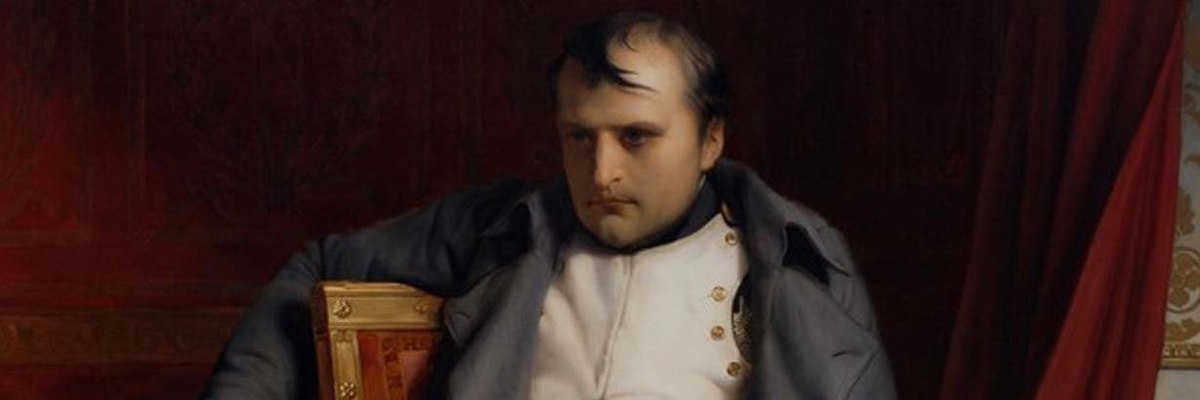Is Napoleon seen as a tyrant and a warmonger, or an ambitious great general?
With the forthcoming release of Ridley Scott’s biopic ‘Napoleon’ in November, the legacy of the French emperor is likely to come under the spotlight once again.
With this in mind, a new YouGov EuroTrack study examines attitudes towards the famous Frenchman across seven different nations: France, Britain, Germany, Italy, Spain, Denmark and Sweden.
A detailed view of French public opinion on Napoleon can be found in this piece’s sister article here. The following examines how French attitudes compare with other European countries.
Of the seven European nations that make up EuroTrack, Napoleon is unsurprisingly most popular in France. There 34% of people have a favourable opinion of the former emperor, compared to 21% who have an unfavourable view, and 34% who say their view is “neither favourable nor unfavourable”.
Outside of France, Napoleon’s highest ‘favourable’ score is in Italy (a country which did not exist during his lifetime). A quarter of Italians (26%) have a positive view of Bonaparte, although these are balanced by the 23% with an unfavourable opinion. Italy also has the highest number of people who express a ‘neither positive nor negative’ opinion, at 42%.
While the number of people with a favourable view of Napoleon is lowest in Britain (12%), he is most actively unpopular in Spain, where 45% of people have an unfavourable opinion. Spain’s experience during the Napoleonic Wars was particularly bitter, with the nationwide guerilla resistance against French occupation often being met with harsh reprisals against civilians.
While the German experience was very different (not that Germany as a country existed at the time either), Germans are similarly likely to have a negative opinion of Bonaparte, at 43%.
The Germans are the most likely outside of France to feel they know much about Napoleon, at 65% and 72% respectively. Most Italians likewise feel they know a “great deal” or “fair amount” about the emperor (53%).
Napoleon knowledge is least widespread in Denmark (25%) and Britain (28%).
What is the most common impression of Napoleon?
Asked to choose up to three terms they most associate with Napoleon, the most common choice in France is “ambitious”, at 43%. This was likewise the most common answer in Spain (55%) and Italy (52%).
The persistent power of British propaganda is proven by the fact that the most common answer in Britain and Germany is that Napoleon was “physically short”, at 37% and 52% respectively. That the French emperor was physically short was a core feature of British propaganda and satire during the Napoleonic era, although at five foot six and a half inches (168cm if you're a European reader) he was in fact average height for the time.
By contrast, in Denmark and Sweden the most frequently selected word was “warmonger” – 42% of Danes gave this answer, as did 34% of Swedes (tied with “great general”).
The four terms mentioned, as well as “authoritarian” typically rank highest across the surveyed nations.
Three differences between France and the other nations stand out. First is that the French are least likely to put “warmonger” in their top three words (just 9% did so), and second and third are that they are most likely to say “visionary” (24%) and “great administrator” (16%).
Relatively few in any country chose to brand Napoleon a “tyrant” (10-18%). Indeed, in discussing his forthcoming take on Napoleon’s rise, Ridley Scott came under fire for saying he compares Napoleon with Adolf Hitler and Joseph Stalin.
Opinion in each country surveyed is that the Stalin and Hitler comparisons are inappropriate. By contrast, a comparison Scott also drew between Napoleon and Alexander the great is seen by more people in each country as appropriate rather than inappropriate.
What does Napoleon’s legacy look like to Europeans?
The French tend to see Napoleon’s legacy as positive overall, with 37% saying so compared to 10% who think it was negative. A further 27% see it as about equally positive and negative, while 25% are unsure.
These latter two answer options are more common still outside of France, with neutrality or unfamiliarity being the top answer across the other countries.
On a more specific question of whether Napoleon left their own country, as well as France, better or worse off, the view from Italy is particularly striking.
Fully 61% of Italians think that Napoleon left France better off than he found it, a figure that dwarves the same opinion in France itself (31%) or any of the other countries (22-37%).
At the same time, Italians are also the most likely to think Napoleon left their own nation worse off, at 34%, although this is a slightly more complicated notion given that what is now Italy was at the time multiple different countries. This is higher than even in Spain, where 27% feel Napoleon left their land worse off.
How should Napoleon be remembered?
How to remember Napoleon has proved controversial in France, with the bicentennial of Napoleon’s death in 2021 seeing calls for celebrations in some quarters and boycotts in others. Aides to Emmanuel Macron stressed that events that day served as ‘commemoration rather than celebration’.
This is indeed how the French think Napoleon’s legacy should be treated, with 48% saying “he should be marked as a notable historical figure in a neutral or balanced fashion”. Only 13% want to see the former emperor celebrated, while 2% think he should be condemned and 8% say he should not be remembered at all.
Once the bogeyman of the continent, most Europeans outside of France now too see Napoleon simply as a historical figure whose legacy should be marked in a neutral way, at 54-64%. The Spanish and Germans are most likely to want to continue to condemn him, although only 8-10% say so. Outside of France, just 2-4% want to celebrate the emperor’s memory.








